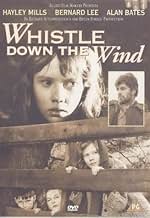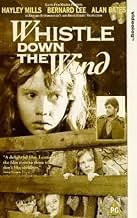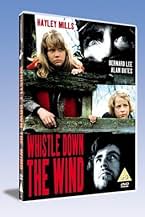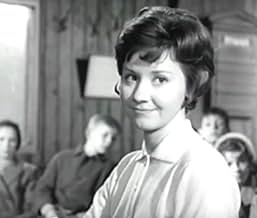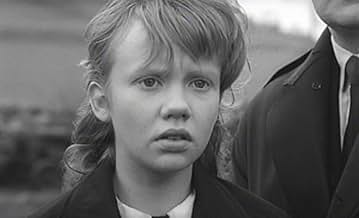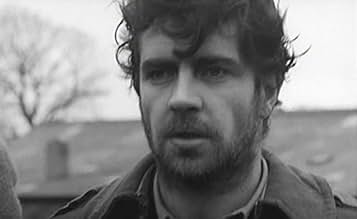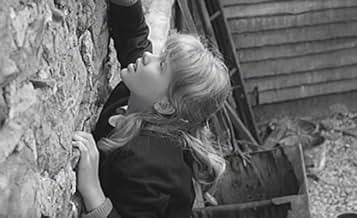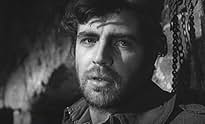When an injured wife murderer takes refuge on a remote Lancashire farm, the owner's three children mistakenly believe him to be the Second Coming of Christ.When an injured wife murderer takes refuge on a remote Lancashire farm, the owner's three children mistakenly believe him to be the Second Coming of Christ.When an injured wife murderer takes refuge on a remote Lancashire farm, the owner's three children mistakenly believe him to be the Second Coming of Christ.
- Director
- Writers
- Stars
- Nominated for 4 BAFTA Awards
- 1 win & 5 nominations total
- Director
- Writers
- All cast & crew
- Production, box office & more at IMDbPro
7.64K
1
2
3
4
5
6
7
8
9
10
Featured reviews
A Wind That Blows Everyone good
Forbes' well-loved film performs a delicate balancing act between symbolism and naturalism, and does so with sensitivity and humour. His achievement becomes more evident when one considers the recent Andrew Lloyd-Webber version of this story, which considerably Americanised and coarsened it, floundering badly as a result. Director Forbes, whose first and arguably finest film this was, had previously been better known as an actor. His skills and experience are in evidence from the start here, as he brings the best out of the children who make up a good proportion of his cast.
In a film that has a lot to say about the grander issues of religion, a lot of the real pleasure here comes from the quieter interactions between youngsters, as they either gauchely hide things from their elders, or express the ironies of simple belief. Juxtaposing the innocence of childhood with the cruelty and persecution of the adult world, and with a fair dose of symbolism and various interpretative levels, the result is in some contrast to the other prestigious productions of the time. The recent ground breaking kitchen sink dramas such as that by Karel Reisz (Saturday Night And Sunday Morning, 1960) or pictures of aggressive social mobility from Jack Clayton (Room At The Top, 1959) were full of working class characters. They focussed on the newly discovered reality of their aims and aspirations, and were part sociological exploration of class, part attempt to wrestle poetry of sorts from everyday life. While Whistle Down the Wind benefits from the breath of fresh air currently blowing through the British industry - the location shoot and naturalistic performances are especially characteristic and effective - the sympathetic portrayals in the film serve to emphasise the fact that its concerns are less sociological than theological, even if its slightly self-conscious air shows a continuing concern to gain a 'significance' from the community, at least of some sort. It's a film where outright class-consciousness rarely raises its head while the anger of the times, seen elsewhere on the contemporary screen, is almost entirely absent. In fact when they occur at all, such issues only appear in the context of organised religion, as for instance when the children encounter the doctrinal certainties of the local vicar, an aloof establishment figure, much more concerned with the vandalism of his church than the urgent questions of his young parishioners. The irony is of course that, while discussing the missing guttering from the church, he is entirely unaware that real spirituality exists in the barn down the road in the hearts of children.
Whistle Down The Wind is something of a family affair, in more ways than one. Not only do the principals mostly spring from the Bostock family or their close acquaintances, but the film itself is based on a novel by Mary Hayley Bell, the wife of actor John Mills and mother of Hayley - who plays the lead Kathy. Some have objected that she is too old to play the part and, strictly speaking this is true, although on screen her proximity to womanhood allows her "I love you" to The Man Blakey (Alan Bates) a meaning potential unavailable to a younger performer. Hayley's role and performance reminds one of another she had provided a couple of years back, in Tiger Bay, a related tale of a platonic love between a child and a murderer. The star spent a good deal of her early career in British film persuading audiences that she could successfully grow up on screen.
Much of the success of the film springs from its gentle and sophisticated treatment of religion. Put in the mouths of babes, doctrinal criticism is thereby sidestepped and the biggest, potential, objection to the piece - that the confusion of a murderer with Christ might be blasphemous - is largely defused by having The Man say very little (his main conversation, an imitation of the parables, is a re-telling to a rapt audience of 'Ruth Lawrence, air hostess' from a comic). The mistake in recognition is made by innocents, and is therefore understandable. The director overcomes objections by charm. And while Forbes has his Man reinforce the mistaken impression by his opening words, the first sight of him, arms outstretched newly appeared in a 'stable' (a evocative stance reprised as he ultimately surrenders), suggestive heavenward point-of-view-shots and so on, the audience is never made to feel uncomfortable with the suggestions. In fact at a time when the BBFC had firm views on the Church and established religion seen on screen, the only other title that comes easily to mind dealing with such matters in a light-hearted and successful way is the very different Boulting brothers' Heavens Above!, with Peter Sellars.
The film's charm is greatly enhanced by a memorable score by Malcolm Arnold, the highlight of which is reworking of We Three Kings - perkily reprised up tempo as the trio of youngsters pay their homage to their 'Christ', or while choreographing a march down the road. The ensemble playing of the film is excellent. Bernard Lee (more familiar to audiences as 'M' in the James Bond series) turns in sterling work as father Bostock, while among the younger actors Alan Barnes as Charlie is also a standout. It is Charlie who expresses the final disillusionment: "It isn't Jesus, it's just some fella," but faith of sorts remains amongst many of the children, even as Blakey is led away. The film's final sense is of religious reinforcement rather than disappointment ("You missed him this time but he'll be coming again," Kathy tells some latecomers to the barn) while the details of the murder in question is left sufficiently vague so as not to entirely deprive Bates' character of sympathy, even as he is handed over to the authorities. There's a sense that the killer has been redeemed by the innocence and trust of his admirers rather than the other way round - a subtly ironic turn of events, which never the less makes for a satisfying conclusion. For those who enjoy British cinema of this decade the charming experience offered by Forbes' debut is unmissable, while others who have seen the film before there will be no hesitation.
In a film that has a lot to say about the grander issues of religion, a lot of the real pleasure here comes from the quieter interactions between youngsters, as they either gauchely hide things from their elders, or express the ironies of simple belief. Juxtaposing the innocence of childhood with the cruelty and persecution of the adult world, and with a fair dose of symbolism and various interpretative levels, the result is in some contrast to the other prestigious productions of the time. The recent ground breaking kitchen sink dramas such as that by Karel Reisz (Saturday Night And Sunday Morning, 1960) or pictures of aggressive social mobility from Jack Clayton (Room At The Top, 1959) were full of working class characters. They focussed on the newly discovered reality of their aims and aspirations, and were part sociological exploration of class, part attempt to wrestle poetry of sorts from everyday life. While Whistle Down the Wind benefits from the breath of fresh air currently blowing through the British industry - the location shoot and naturalistic performances are especially characteristic and effective - the sympathetic portrayals in the film serve to emphasise the fact that its concerns are less sociological than theological, even if its slightly self-conscious air shows a continuing concern to gain a 'significance' from the community, at least of some sort. It's a film where outright class-consciousness rarely raises its head while the anger of the times, seen elsewhere on the contemporary screen, is almost entirely absent. In fact when they occur at all, such issues only appear in the context of organised religion, as for instance when the children encounter the doctrinal certainties of the local vicar, an aloof establishment figure, much more concerned with the vandalism of his church than the urgent questions of his young parishioners. The irony is of course that, while discussing the missing guttering from the church, he is entirely unaware that real spirituality exists in the barn down the road in the hearts of children.
Whistle Down The Wind is something of a family affair, in more ways than one. Not only do the principals mostly spring from the Bostock family or their close acquaintances, but the film itself is based on a novel by Mary Hayley Bell, the wife of actor John Mills and mother of Hayley - who plays the lead Kathy. Some have objected that she is too old to play the part and, strictly speaking this is true, although on screen her proximity to womanhood allows her "I love you" to The Man Blakey (Alan Bates) a meaning potential unavailable to a younger performer. Hayley's role and performance reminds one of another she had provided a couple of years back, in Tiger Bay, a related tale of a platonic love between a child and a murderer. The star spent a good deal of her early career in British film persuading audiences that she could successfully grow up on screen.
Much of the success of the film springs from its gentle and sophisticated treatment of religion. Put in the mouths of babes, doctrinal criticism is thereby sidestepped and the biggest, potential, objection to the piece - that the confusion of a murderer with Christ might be blasphemous - is largely defused by having The Man say very little (his main conversation, an imitation of the parables, is a re-telling to a rapt audience of 'Ruth Lawrence, air hostess' from a comic). The mistake in recognition is made by innocents, and is therefore understandable. The director overcomes objections by charm. And while Forbes has his Man reinforce the mistaken impression by his opening words, the first sight of him, arms outstretched newly appeared in a 'stable' (a evocative stance reprised as he ultimately surrenders), suggestive heavenward point-of-view-shots and so on, the audience is never made to feel uncomfortable with the suggestions. In fact at a time when the BBFC had firm views on the Church and established religion seen on screen, the only other title that comes easily to mind dealing with such matters in a light-hearted and successful way is the very different Boulting brothers' Heavens Above!, with Peter Sellars.
The film's charm is greatly enhanced by a memorable score by Malcolm Arnold, the highlight of which is reworking of We Three Kings - perkily reprised up tempo as the trio of youngsters pay their homage to their 'Christ', or while choreographing a march down the road. The ensemble playing of the film is excellent. Bernard Lee (more familiar to audiences as 'M' in the James Bond series) turns in sterling work as father Bostock, while among the younger actors Alan Barnes as Charlie is also a standout. It is Charlie who expresses the final disillusionment: "It isn't Jesus, it's just some fella," but faith of sorts remains amongst many of the children, even as Blakey is led away. The film's final sense is of religious reinforcement rather than disappointment ("You missed him this time but he'll be coming again," Kathy tells some latecomers to the barn) while the details of the murder in question is left sufficiently vague so as not to entirely deprive Bates' character of sympathy, even as he is handed over to the authorities. There's a sense that the killer has been redeemed by the innocence and trust of his admirers rather than the other way round - a subtly ironic turn of events, which never the less makes for a satisfying conclusion. For those who enjoy British cinema of this decade the charming experience offered by Forbes' debut is unmissable, while others who have seen the film before there will be no hesitation.
A sunday afternoon classic
One of my favourite english films. Beautifully portraying rural Lancashire life in the sixties. The story is touching and marvellously played by all the children involved. One of the few films that can bring a tear to my eye, maybe because it reminds me of the child I once was in the sixties, but probably because it is a moving film and I suspect it would have the same affect on a native New Yorker. One of those old classics that if you haven't seen yet, you will be pleasantly surprised when you get round to it. You can take it as recommended!
superb, superior children's film
The original story, before Andrew Lloyd-Webber americanised it (and ruined it, IMO), was written by Hayley Mills' mother, Mary Hayley Bell, and starred Hayley as a Northern girl who thinks she finds Jesus Christ returned to Earth and living in her father's barn. In fact the man is a convict on the run (beautifully played by Alan Bates, one of his best early roles).
The girl and her sister and little brother (Alan Barnes, a superb performance) cosset the man and plot to keep him secret from the adults, because of what happened to him 'last time'. The man in turn is bewildered by the increasing adultation and attention of the neighbouring kids.
One of the strongest points of the story, aside from the contention that religion really couldn't cope with the return of Christ, is the developing attraction between the pre-teen Mills and Bates. This is understated but unmistakable, and owes a lot to Hayley's talent when she was a child actress. The music by Matthew Arnold is superb and Bryan Forbes' direction is sympathetic and cleverly done.
Perhaps the final symbolism is overdone but 'Whistle' is an excellent film that lingers long in the memory.
The girl and her sister and little brother (Alan Barnes, a superb performance) cosset the man and plot to keep him secret from the adults, because of what happened to him 'last time'. The man in turn is bewildered by the increasing adultation and attention of the neighbouring kids.
One of the strongest points of the story, aside from the contention that religion really couldn't cope with the return of Christ, is the developing attraction between the pre-teen Mills and Bates. This is understated but unmistakable, and owes a lot to Hayley's talent when she was a child actress. The music by Matthew Arnold is superb and Bryan Forbes' direction is sympathetic and cleverly done.
Perhaps the final symbolism is overdone but 'Whistle' is an excellent film that lingers long in the memory.
"T' aint Jesus, its just some fellah"
An absolute gem of a movie, that will appeal to both the religious, & atheists alike, since it intelligently sides with neither side. WDTW is a beautifully crafted study in "belief", faith and innocence.
Reminiscent of Ken Loach's 1969 film Kes (although the two are very different films) in so much that it accurately portrays a time & place, by using genuine locals as a supporting cast, thus giving a true sense of authenticity because of the genuine regional accents.
Little Alan Barnes's natural lancashire dialect is a pure delight in the opening scene with "The sally army lady", and his loss of "faith" in "Jesus" ("T' aint Jesus, its just some fellah") is a poignant counterpoint to Mills's stoic acceptance of the fugitive hiding in the family barn as her saviour.
Highly recommended viewing.
Reminiscent of Ken Loach's 1969 film Kes (although the two are very different films) in so much that it accurately portrays a time & place, by using genuine locals as a supporting cast, thus giving a true sense of authenticity because of the genuine regional accents.
Little Alan Barnes's natural lancashire dialect is a pure delight in the opening scene with "The sally army lady", and his loss of "faith" in "Jesus" ("T' aint Jesus, its just some fellah") is a poignant counterpoint to Mills's stoic acceptance of the fugitive hiding in the family barn as her saviour.
Highly recommended viewing.
Under-rated classic British movie of the sixties
Hayley Mills excels in this understated, underrated movie juxtaposing the sordid criminal world (Alan Bates as a murderer on the run) with the innocence of children. Cleverly designed, perfectly acted (by all the children as well as the adults), pithily appropriate screenplay, believable accents (the setting is the Yorkshire moors in England), and a well-balanced, carefully planned production all combine to produce a mesmerising gem of a film. Already a star, Hayley Mills proved she was not just a pretty face and built on her impressive performance in Tiger Bay to create a moving character of budding adolescence, still trapped in childhood innocence and belief. The period of the early sixties is neatly conveyed, and Hayley Mills as Cathy creates a metaphor for the deeper layer of the film's message of the increasing social awareness and diminishing religious belief (despite the traditional Sunday School attitudes and practices) which was gradually bringing about the social change of Britain in the sixties. The story is well told, the drama is dynamic, the actors do a marvellous job and the film certainly deserves to be better known, if not least because it's an early example of Richard Attenborough's production skills.
Did you know
- TriviaThe title "Whistle Down the Wind" originally comes from falconry and means "to let a falcon fly away free."
- GoofsIn several scenes, but especially when the children are in the barn discussing a name for the cats, the youngest boy can be seen mouthing the other characters lines before he says his own.
- Quotes
Charlie Bostock: It isn't Jesus. It's just a fella.
- Crazy creditsThe character played by Alan Bates is named Arthur Alan Blakey in the movie, but in the credits he is listed as "The Man."
- ConnectionsFeatured in Blue Peter: Episode #4.32 (1961)
- SoundtracksWe Three Kings
(uncredited)
Words and Music by John H. Hopkins (as Reverend John Henry Hopkins,, Jr.)
Incorporated into incidental music
- How long is Whistle Down the Wind?Powered by Alexa
Details
Box office
- Budget
- £148,000 (estimated)
- Runtime
- 1h 39m(99 min)
- Color
- Aspect ratio
- 1.66 : 1
Contribute to this page
Suggest an edit or add missing content

